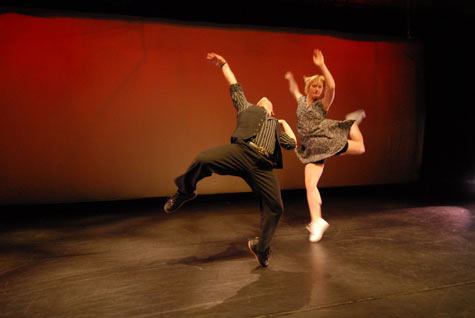
EVOCATIVE DUET Ros and Rachael Jungels. |
The members of Everett Dance Theatre are nothing if not adventurous, tackling such topics as aeronautics, inner-city neighborhoods, and current events in earlier pieces. After Aaron Jungels, co-founder/co-artistic director of the company with his mother Dorothy and sister Rachael, began an exploration of his relationship with his autistic nephew almost 10 years ago, Everett members became interested in telling even harder stories than those from newspaper headlines or science textbooks: tales of one’s own family and one’s inner life.
In Everett’s new piece, The Smiling Lady, the narratives fixate on each of the four dancer’s dreams (May 28-30 and June 4-6). Aaron and Rachael are joined by their 16-year-old niece Grace Bevilacqua and long-time Everett member Sokeo Ros (also director of the hip-hop troupe Case Closed). Live music, most in tango or musette mode, is performed by Alec K. Redfearn, Yana Kiriacopoulos, and Chris Sadlers.
The set-up is a nightclub cabaret, opening with a mysterious waiter who clambers onstage and welcomes us, in slow, measured cadences (and a growly, somewhat spooky voice), to “his nightmare” and to our own dreams.
From there we are immediately plunged into Aaron’s nightmare, told in his characteristic deadpan, as he balances himself, eyes closed, on a rolling office chair. As always, in Everett’s storytelling pieces, the props and the movement are metaphorical enhancements of the words. Aaron is precarious because his dream is about playing football in the RISD library and having all the stacks come tumbling down. He hears his mother’s voice urging him to just follow Alec and his accordion, but he rejects that idea.
The dream-telling shifts to young Grace and her vision of a formal dinner at her grandparents’ house that turns bloody with knives and a mysterious young boy coming through the front door to help her. The scene shifts again to the “Nightmare Hotline,” in which Aaron is the host and “Janet” a caller who strongly suggests a sexual interpretation to Grace’s dream.
The “Hotline” is a recurring motif, as is Sokeo’s sleeping and waking dream of “the smiling lady,” someone who calms him down and who (in Rachael and then Aaron’s words) teaches him something about life and about being loved for who he is: “She lets you be as jerky as you can be, and she hates the jerk but not the man.”
Such pithy pronouncements are part of the charm of this piece, never coming across as psychobabble or feeble philosophizing. They are nuggets, strategically placed among the captivating storytelling and the flowing movement sequences (the tango quartet with office-chair partners is delightful; the extended Sokeo and Rachael duet beautiful and evocative).
The dream descriptions are often told by one person and acted out by others (the dramatic effect augmented by white-face masks). Aaron slumps in a chair, as Sokeo relates his absorption in his smiling-lady vision; Grace slinks over and under Sokeo, Aaron, and two rolling chairs, as Rachael tells of trying to get to a birthday party by crawling on her belly over a human roller coaster; Rachael, Grace, and Aaron enact Sokeo’s nightmare of an ambulance crashing into a car. And, perhaps most memorably, Sokeo does an amazingly light-footed hip-hop segment to tango-flavored music, head down, hands in pockets (shades of Gene Kelly), as Aaron runs through a gamut of feelings — Sokeo’s hands join in as his confidence builds.